
"I Heard It Through the Grapevine" is a song written by Norman Whitfield and Barrett Strong for Motown Records in 1966. The first recording of the song to be released was produced by Whitfield for Gladys Knight & the Pips and released as a single in September 1967. It went to number one on the Billboard R&B Singles chart and number two on the Billboard Pop Singles chart and shortly became the biggest selling Motown single up to that time.
"Someday We'll Be Together" is a song written by Johnny Bristol, Jackey Beavers, and Harvey Fuqua. It was the last of twelve American number-one pop singles for Diana Ross & the Supremes on the Motown label. Although it was released as the final Supremes song featuring Diana Ross, who left the group for a solo career in January 1970, it was recorded as Ross' first solo single and Supremes members Mary Wilson and Cindy Birdsong do not sing on the recording. Both appear on the B-side, "He's My Sunny Boy".

Gene Chandler is an American singer, songwriter, music producer, and record-label executive. Chandler is nicknamed "the Duke of Earl" or, simply, "the Duke." He is best known for his most successful songs, "Duke of Earl" and "Groovy Situation", and his association with the Dukays, the Impressions, and Curtis Mayfield.

"Hush" is a song written by American composer and musician Joe South, for recording artist Billy Joe Royal. The song was later covered by Somebody's Image in 1967. Their version reached #14 in Australia. It was also covered by Deep Purple in 1968 and by Kula Shaker in 1997. Each artist had a Top 5 hit with their version.
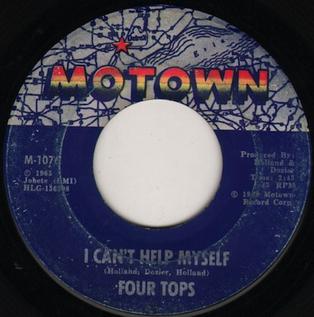
"I Can't Help Myself" is a 1965 song recorded by the Four Tops for the Motown label.

"I'll Be There" is the first single released from Third Album by The Jackson 5. It was written by Berry Gordy, Hal Davis, Bob West, and Willie Hutch.
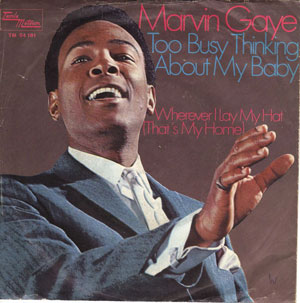
"Too Busy Thinking About My Baby" is a Motown song written by Norman Whitfield, Barrett Strong, and Janie Bradford. The song was first recorded by The Temptations as a track on their 1966 album Gettin' Ready. Eddie Kendricks sings lead on the recording, which was produced by Whitfield. Jimmy Ruffin also recorded a version with The Temptations providing background vocals in 1966. It remained unreleased until 1997.
"That's the Way Love Is" is a 1967 Tamla (Motown) single recorded by The Isley Brothers and produced by Norman Whitfield.

Barbara Jean Acklin was an American soul singer and songwriter, who was most successful in the 1960s and 1970s. Her biggest hit as a singer was "Love Makes a Woman" (1968). As a songwriter, she is best known for co-writing the multi-million-selling "Have You Seen Her" (1971) with Eugene Record, lead singer of the Chi-Lites.

"Tonight You Belong to Me" is an American popular song, written in 1926 by lyricist Billy Rose and composer Lee David. The first ever recording was made by Irving Kaufman in 1926 on Banner Records. In 1927 Gene Austin recorded it and the song became a major hit. Another popular recording during this time was by Roger Wolfe Kahn and his Orchestra.
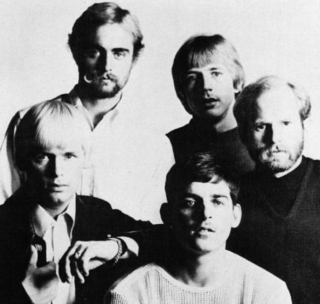
Harpers Bizarre was an American sunshine pop band of the 1960s, best known for their Broadway/sunshine pop sound and their cover of Simon & Garfunkel's "The 59th Street Bridge Song ."
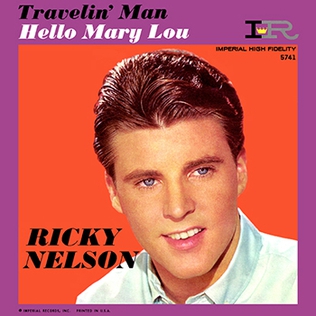
"Hello Mary Lou" is a song written by American singer Gene Pitney first recorded by Johnny Duncan in 1960 and by Ricky Nelson at United Western Recorders Studios on March 22, 1961.
"Heartaches by the Number" is a popular country song written by Harlan Howard, and published in 1959. The sheet music was a best seller in both the US and Britain in January 1960.
"Wherever I Lay My Hat (That's My Home)" is a song written by Marvin Gaye, Barrett Strong and Norman Whitfield, and first recorded by Gaye in 1962. It was the B-side to his 1969 hit "Too Busy Thinking 'Bout My Baby". Paul Young's version of the song was a UK No. 1 single for three weeks in July 1983.

"Kiss and Say Goodbye" is a 1976 song by American R&B vocal group the Manhattans. It was written by group member Winfred Lovett, the bass singer and songwriter of the group, who did the song's spoken introduction. The song was recorded for the album The Manhattans, released in 1976 by Columbia Records, and was released as a single in March of the same year. "Kiss and Say Goodbye" became a worldwide success, appearing in the musical charts of countless countries, a Top 10 hit in many countries, including No. 1 in the US, Belgium, Netherlands, New Zealand, and in Europe (European Hot 100 Singles). With the exception of the Adult Contemporary Chart, "Kiss and Say Goodbye" was ranked number 1 in the US on all pop and R&B singles charts. The song was one of the biggest hits of 1976 and of the 1970s.

"Cherry, Cherry" is a 1966 song written, composed, and recorded by American musician Neil Diamond.
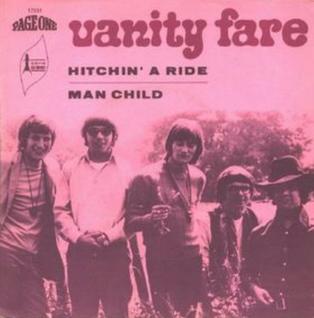
"Hitchin' a Ride" is a song written by Mitch Murray and Peter Callander issued as a single by the English pop/rock band Vanity Fare in late 1969. It reached number 16 on the UK Singles Chart in February 1970 but was a bigger hit in the United States, reaching number 5 on the Hot 100 on June 27, 1970. Billboard ranked the record as the number 14 song of 1970. In Chicago, the record achieved even greater heights, topping the WCFL Big 10 Countdown on 18–25 May 1970, ranking #4 for all of 1970 and ranking #12 on rival WLS Radio 89 Hit Parade on 6 July 1970, ranking #10 for all of 1970. "Hitchin' a Ride" sold a million copies in the United States alone, and it became a gold record.

"Still Water (Love)" is a 1970 hit single written by Smokey Robinson and Frank Wilson for the Motown singing group Four Tops. The B-side was "Still Water (Peace)" and both songs appear on the 1970 album Still Waters Run Deep.

"Until It's Time for You to Go" is a song from the 1965 album Many a Mile by American singer-songwriter Buffy Sainte-Marie. Sainte-Marie included a French-language reworking of the song, "T'es pas un autre", on her 1967 album Fire & Fleet & Candlelight. French translation was made by Quebecer songwriter Claude Gauthier.
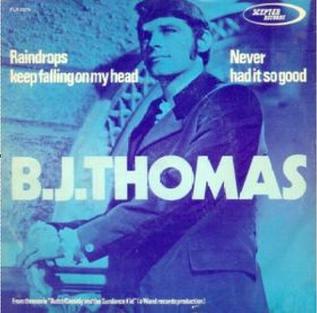
"Raindrops Keep Fallin' on My Head" is a song written by Burt Bacharach and Hal David for the 1969 film Butch Cassidy and the Sundance Kid. The uplifting lyrics describe somebody who overcomes his troubles and worries by realising that "it won't be long till happiness steps up to greet me."
















